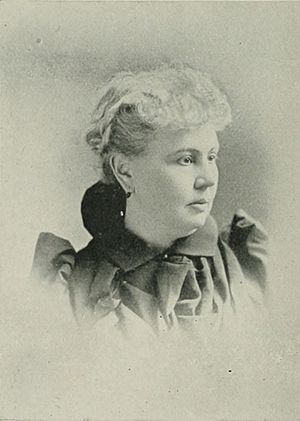A. Viola Neblett facts for kids
A. Viola Neblett (March 5, 1842 – April 30, 1897) was an American activist who worked for important changes in her time. She was a leader in the Temperance movement, which aimed to reduce alcohol use. She was also a strong supporter of women's right to vote, known as suffrage. She was a pioneer for women's rights in general.
Viola Neblett worked tirelessly for temperance in Greenville, South Carolina. She was the first woman in her state to publicly support women's right to vote. She played a big part in a national meeting for women's suffrage in Atlanta in 1895. Later, she spent months in Washington, D.C. trying to get women the right to vote in South Carolina's new constitution. She even planned to leave money to the National American Woman Suffrage Association to help their cause. In her hometown, she started the Neblett Free Library, which was the first library in Greenville.
Contents
Early Life
Viola Wright was born in Hamburg, Aiken County, South Carolina, on March 5, 1842. Her first name was Ann or Adelaide. When she was six months old, her parents moved back to their home in Augusta, Georgia. Viola's father, Adrian Wright, passed away before she turned eight years old.
Viola came from two old families in Virginia. Her great-grandfather was a captain in the American Revolutionary War. Her grandmother was a dedicated Methodist church leader.
Viola grew up in a quiet home in Augusta. After the American Civil War ended, her family faced financial hardship. This was because the abolition of slavery changed their economic situation.
Her Work
Working for Temperance
In February 1867, Viola married James M. Neblett. He was a successful businessman from Virginia. They lived in Augusta until 1879, then moved to Greenville, South Carolina.
In Greenville, Viola Neblett became a founding member of the Thursday Club. This was Greenville's first women's organization. She helped write the club's rules and started its first newspaper. At that time, working for temperance was one of the few causes that many men thought was acceptable for women to support.
Viola became a very active worker for the Woman's Christian Temperance Union (WCTU). She showed great leadership skills and spent a lot of her time on this cause. She also worked closely with another important activist, Virginia Durant Young, at a WCTU meeting in 1880.
Fighting for Women's Rights
"Woman as an intelligent, responsible being should have a voice in law-making. Now she has indirect influence without responsibility, which is demoralizing." -A. Viola Neblett (1895)
In 1890, Viola Neblett started the South Carolina Equal Rights Association in Greenville. She and Virginia Young took turns being its president. Neblett was the first woman in South Carolina to publicly sign her name to support women's right to vote. This was a brave act, as it could have led to her being disliked in the conservative South.
In March 1895, she traveled around South Carolina. She arranged for speakers to visit towns and talk about women's suffrage. In August, Neblett visited Washington D.C. She met with the editor of The Woman's Tribune, a newspaper that supported women's rights.
Neblett hoped that South Carolina would be one of the first states to give women the right to vote. She and other women's rights supporters attended the South Carolina Constitutional Convention in September. They talked to the delegates and gave them information about suffrage. They even spoke publicly to the entire convention.
Although women's suffrage was not passed at that time, Neblett and Young helped make other important changes. They helped raise the legal age of protection for young people from ten to fourteen. They also helped women gain the right to be the legal guardians of their own children.
Her Beliefs
After many years of studying and thinking about religious ideas, Viola Neblett developed broader views about the Bible. She agreed with more modern religious thoughts of her time. She had grown up seeing slavery. After it ended, she believed that African Americans could improve their lives through education.
Neblett Free Library
James Neblett, Viola's husband, passed away in 1890 or 1891. He had always supported her charity work. In 1896, Viola Neblett decided to leave most of her property to the Neblett library. She had already started this library.
Viola Neblett died on April 30, 1897. She was buried in Magnolia Cemetery in Augusta. She left her property, worth about US$20,000, and money to a free library association. The library's name was changed to Neblett Library.
However, there was a legal challenge to her will. A court case followed, and in 1900, the South Carolina Supreme Court decided against the library. This meant the library did not receive the US$20,000 she had left for it. But because Neblett had given her home to the library trustees in 1896, the building itself was not affected by the court's decision. Also, a US$500 gift she left to the National American Woman Suffrage Association was not overturned.
 | Misty Copeland |
 | Raven Wilkinson |
 | Debra Austin |
 | Aesha Ash |


